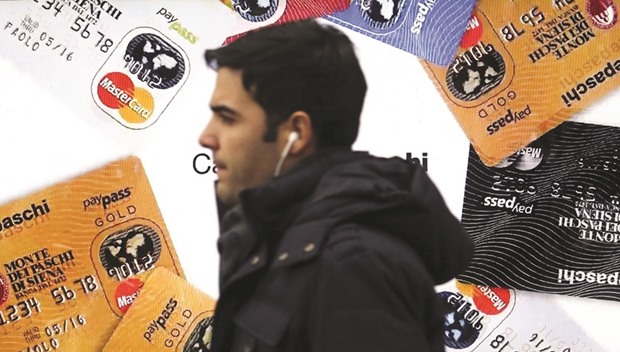Some Monte dei Paschi customers have been pulling savings out of the Italian bank, its chief executive said yesterday, as it faces a crisis over a mountain of bad loans that has halved its market value this year.
CEO Fabrizio Viola did not say how much money savers had withdrawn, or when the outflow began, though he said the fall in deposits was “limited” and that the bank could cope with it as he sought to reassure customers and investors.
Italian bank shares have lost 20% so far this year as investors, already rattled about global economic growth, have sold out of a sector with low profitability and about €200bn ($218bn) of loans that are unlikely to be repaid.
Monte Paschi — Italy’s third-biggest bank — has lost the most ground as it is perceived to be the most vulnerable; it has the highest level of bad loans as a proportion of assets and was the worst performer in a 2014 health check of eurozone lenders.
The Tuscan-based bank’s stock, which had sunk 15% on Monday and 14.4% on Tuesday, was suspended from trading several times after falling 18.2% yesterday. The plunge helped dragged down all other Italian banking stocks, with Carige shedding 12.7% and Banco Popolare falling more than 6%.
“Of course clients turning to our local branches are worried about what they read,” Viola said in a statement.
“At present the size of the funding lost due to clients who decided to move part of their savings elsewhere is limited and anyway below levels seen during the previous crisis the bank faced in February 2013 which was overcome brilliantly.”
The 2013 crisis he was referring to was when the world’s oldest bank, already badly weakened by the euro zone debt crisis, was hit by a scandal about loss-making derivatives trades.
Monte Paschi’s bonds also suffered yesterday, with a September 2020 subordinated paper yielding 24%, up from 19% at Tuesday’s close and just above 10% on Friday.
A Milan bond trader said both retail and some institutional investors were trying to sell the bank’s debt. “Everyone is trying to get out. Retail for sure but I saw also a couple of fund managers today,” the trader said.
Italian lenders’ huge pile of soured loans is tying up capital and holding back fresh credit that could support a fragile economic recovery in the country.
A boost to bank stocks from merger speculation following an overhaul of cooperative lenders last year has fizzled out as a deal has yet to materialise.
Monte Paschi was told by the European Central Bank to seek a buyer after the 2014 health check. It appointed UBS and Citi as advisers more than a year ago but has so far failed to find one.
A rescue of four small lenders at the end of last year carried out under new EU rules which imposed losses on shareholders and junior bondholders has, meanwhile, caused concerns among Italians, traditionally large holders of bank debt.
Since then, there have been concerns that customers could move money out of lenders perceived as weaker, to those banks considered stronger, say industry players.
“Over the past few days many have been wondering about the pace at which people closed their accounts and sold bank bonds,” said Giuseppe Sersale, a fund manager at Anthilia Capital Partners. “I wouldn’t call it a bank run but there are definitely outflows,” he added.
Viola said the plunge in Monte Paschi shares was not a reflection of the bank’s fundamentals, which he said had improved in the last quarter of 2015.
He said revenues rose both compared with the third quarter and from a year earlier while costs were cut, adding that liquidity levels at the end of 2015 were at their highest in four years and the bank’s capital base was adequate. The bank reports its annual results on February 5.
Italy banks lose $82bn of cheap funds as savers see risks
Bloomberg/London
Italian savers ditched €75bn ($82bn) of bank bonds in the year ended September, further depriving lenders of a cheap source of funding.
Retail holdings of the notes tumbled 27% in the period to €200bn, extending declines since 2012, based on Bank of Italy data released on Monday. There was a €5bn drop in the three months ended September, marking a slowdown from previous quarters.
Savers are shunning bank bonds as losses at four small lenders in November have made more people aware that the investments are risky. The cash drain has contributed to a slump in prices for junior bonds, as lenders turn to more expensive wholesale financing and contend with tighter European Union rules on state aid.
“A lot of these banks have survived better thanks to retail funding,” Alberto Gallo, head of macro-credit research at Royal Bank of Scotland Group, said before the data was released. “If you take out the retail-funding channel some banks may find it more expensive to fund.”
A new EU bail-in regime, which forces lenders to impose losses on creditors before they can accept state aid, has driven declines in Italian bank bonds this year, Gallo said.
Banca Popolare di Vicenza’s €200mn of 9.5% subordinated notes due September 2025 have dropped to 74¢ on the euro from 96¢ on December 31, according to data compiled by Bloomberg. Banca Monte dei Paschi di Siena’s €379mn of 5.6% September 2020 bonds have fallen to 74¢ from 95¢.

A Monte Paschi di Siena advertising is seen on a bank window in Milan. Monte Paschi CEO Fabrizio Viola said the fall in deposits yesterday was u201climitedu201d and that the bank could cope with it as he sought to reassure customers and investors.
